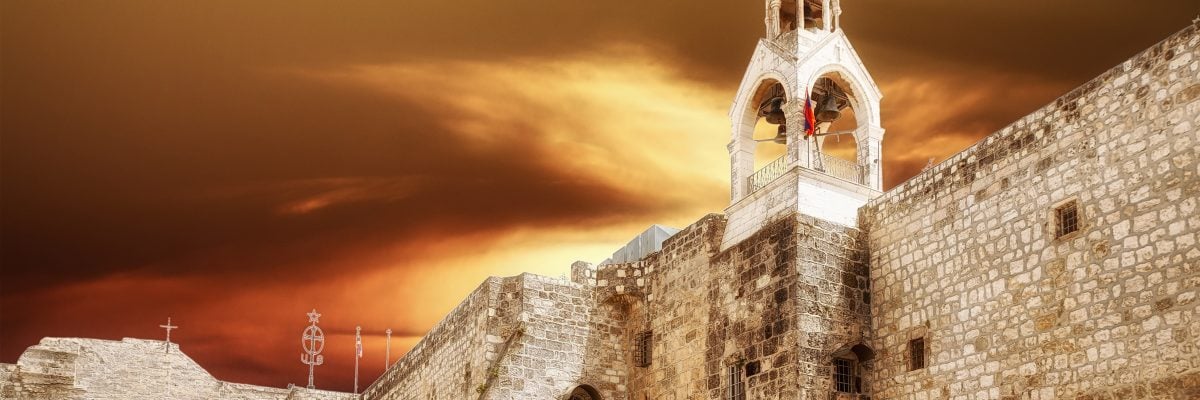
Homily for the Feast of the Nativity of Our Lord Jesus Christ, B Cycle
In those days a decree went out from Caesar Augustus
that the whole world should be enrolled.
This was the first enrollment,
when Quirinius was governor of Syria.
So all went to be enrolled, each to his own town.
And Joseph too went up from Galilee from the town of Nazareth
to Judea, to the city of David that is called Bethlehem,
because he was of the house and family of David,
to be enrolled with Mary, his betrothed, who was with child.
While they were there,
the time came for her to have her child,
and she gave birth to her firstborn son.
She wrapped him in swaddling clothes and laid him in a manger,
because there was no room for them in the inn.Now there were shepherds in that region living in the fields
and keeping the night watch over their flock.
The angel of the Lord appeared to them
and the glory of the Lord shone around them,
and they were struck with great fear.
The angel said to them,
“Do not be afraid;
for behold, I proclaim to you good news of great joy
that will be for all the people.
For today in the city of David
a savior has been born for you who is Christ and Lord.
And this will be a sign for you:
you will find an infant wrapped in swaddling clothes
and lying in a manger.”
And suddenly there was a multitude of the heavenly host with the angel,
praising God and saying:
“Glory to God in the highest
and on earth peace to those on whom his favor rests.”
-Luke 2:1-14
Bethlehem. The name means “house of bread.” It was in this town with such an evocative name that the One was born who said, “I am the bread which came down from heaven” and, “I am the bread of life.”
Ever since Constantine the Great built the Basilica of the Nativity in the fourth century, a basilica that still stands to this day, pilgrims have come to kneel and press their lips to the spot where the Word Made Flesh was born. And yet directly above the place of the Lord’s birth is the Greek altar on which is offered the Holy Eucharist, and right next to the shrine, in the same very room, there is the Latin altar on which Mass has been offered countless times, just within a few feet of the site of the manger.
Our Lord’s birth in the manger of Bethlehem happened only once, but the even more powerful event of his offering of himself in the holy Mass occurs over and over again, day in and day out, from the rising of the sun to its setting. This offering makes every Catholic church—and also every other church that has the sacramental apostolic succession—a Bethlehem, a “house of bread.”
The Gospel according to St. Luke presents us with an amazing context for understanding Our Lord’s birth at Bethlehem and his gift of himself in the Eucharist. In the second chapter of the Gospel he tells us that the Lord was born in a stable because “there was no room for them in the inn.” In fact the word translated as “inn” really just means “guest room” or upper room. Bethlehem was far too small to have a hotel! What the Gospel means is that the Holy Family had to stay in the back downstairs room, usually a cave in the hill from which the house was built, rather than in the upstairs room, which did not have livestock or the odors of the street.
This very same word is used again in the twenty-second chapter of the same Gospel when Our Lord tells his disciples about the arrangements for the Last Supper. The evangelist uses the very same word for the “upper guest room” of the institution of the Most Holy Eucharist as he uses to explain why the Holy Family was in the stable and not in the upper guest room of the house. How lovely a bracketing of the life of the Lord! Saint Luke is a consummate storyteller. Finally, the Lord, who had no suitable guest room for his birth in the town called “house of bread” now is able to perfect and finish his work in the upper guest room of the Sacrament! This room and every Catholic altar after become the new Bethlehem, the new “house of bread.”
Is there any room for the Lord in our own hearts? Is there a guest room ready and spread out for his feast-day dinner? We have no better way of celebrating Christmas, than Christ’s Mass. In the stable of Bethlehem and in the Upper Room in Jerusalem the Lord comes to us in his very body born of the Virgin Mary. Thanks be to him who so generously has provided us with the banquet of eternal life, the very body, blood, soul, and divinity of Jesus, the holy child of Bethlehem.
Our modern life, with its multiple media and various means of communication, may seem to abolish all the symbolism of the scriptures. We Christians must, in spite of all the atmosphere of unbelief, continue to assert the presence and power among us of the body, blood, soul, and Godhead of the Son of God born for us at Bethlehem and on our altars. Amen.
Photo: Basilica of the Nativity, Bethlehem



